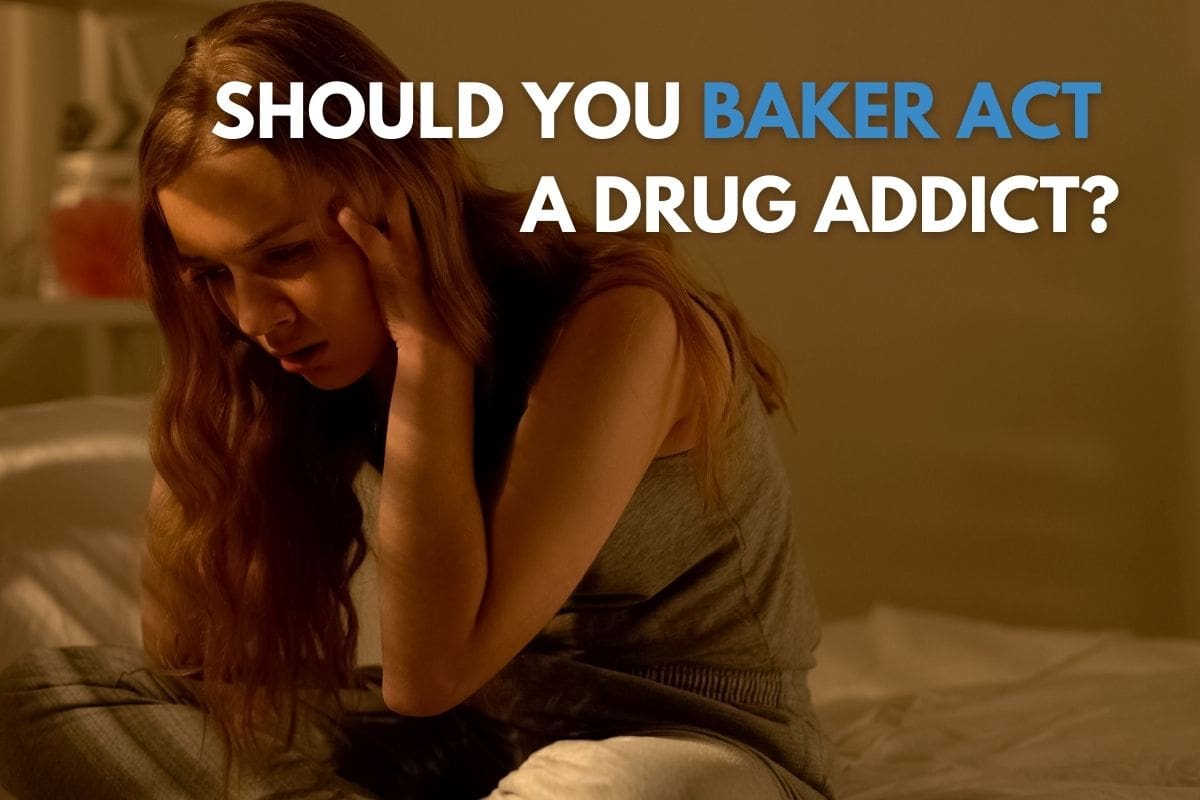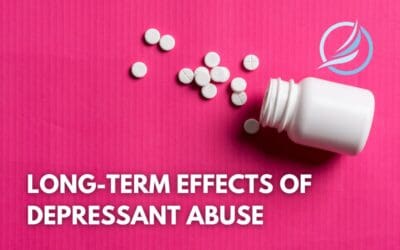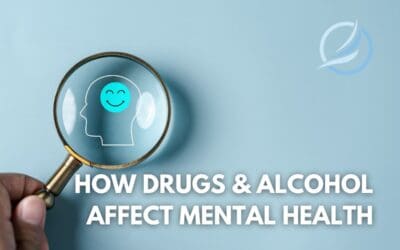

If you know someone addicted to drugs, you know first-hand just how frustrating and frightening it can be when it’s clear that their life is in jeopardy but feel like there’s nothing you can do about it. You’ve likely tried talking to them, giving them ultimatums, maybe even holding an intervention. What do you do when you’ve tried everything else?
The Baker Act, also known as the Florida Mental Health Act of 1971, is legislation that allows individuals who pose a danger to either themselves or others to be involuntarily institutionalized for psychiatric evaluation. This mental health intervention can be life-saving but things can get tricky when drug abuse is involved. From costs to the law’s limitations, there are important things to consider when considering whether you should Baker Act a drug addict.
Table of Contents
The Baker Act process can effectively be summed up into two parts. The first occurs within a 72-hour period where a person undergoes an evaluation to determine they indeed qualify for needed emergency psychiatric care. The second part involves medical professionals and the courts being in agreement that an individual qualifies for treatment.
Although the Baker Act is a Florida-only statute and is not national, the term ‘Baker acted” has become a widely used term around the country, referring to any kind of involuntary institutionalization.
There are three ways that a person can be involuntarily Baker acted: Law enforcement, health professionals, or an ex parte court order (which is essentially a petition to judge by friends and family members). If there’s enough evidence to prove that a person is experiencing severe mental illness, they will then be transported by law enforcement to a mental health facility for prompt examination.
Note that in the case of an arrest, when it’s law enforcement who initiates the Baker Act, the person is first processed as a criminal suspect before an examination is later conducted at a receiving facility.
Once institutionalized, attorneys or guardians will be notified of their admission no later than 24 hours after arriving. Here, the Baker-acted person will undergo a mental health evaluation by a physician, clinical psychologist, psychiatric nurse, or clinical social worker to confirm the required criteria:
If the person is deemed not to require psychiatric intervention, they will be released (or go back into law enforcement custody if they were arrested prior), sometimes with a recommendation for voluntary mental health treatment. If the person is found to need treatment but refuses, the facility can then petition the court to have the person committed for a period of up to six months.
Although the Baker Act strictly applies to mental health treatment rather than substance abuse, it can still provide many benefits to a person addicted to drugs–particularly since the two conditions go hand-in-hand (long-term drug use can lead to the development of conditions like depression and psychosis and vice versa, untreated mental illness often leads people to self-medicate with drugs, which can lead to addiction). Here are a few things to consider before invoking one of Florida’s most powerful laws.
Something else that has a strong correlation with drug use? Getting in trouble with the law. Approximately 20% of all incarcerated Americans are there for a drug offense. Unfortunately, as many prisoner-advocates have pointed out, most jails and prisons are poorly equipped to treat substance abuse. Of the more than 3,200 jails in the country, only 23 provide medically-assisted treatments (MAT) such as Suboxone or methadone. The Baker Act can circumvent criminal processing and have them go to a facility to receive help for drug use, rather than immediately being imprisoned.
As the concerned loved one, you’ll need to file an ex parte petition to begin the Baker Act process. This requires concrete examples that the addicted person is a danger to themselves and is too impaired to manage their own wellbeing in the form of a sworn written testimony before a notary. Once the petition makes its way in front of a judge who feels the criteria has been met, things move quite quickly.
A big responsibility of the friends or family members trying to Baker Act an addicted person is finding a mental health facility that has space available or is willing to accept a person being involuntarily committed. These facilities have the ability to refuse court-ordered patients, which can make this requirement even more challenging to fulfill.
Even if an individual is involuntarily committed to a mental health treatment facility, they’re still on the hook for paying treatment costs. Local and state governments do not cover these costs unless the Baker Act was initiated by law enforcement due to an arrest. While money should never be a deterrent from receiving essential medical care (and medical providers are required to assist those who have difficulty paying), it’s something to consider especially if there are still other avenues available.
Although Baker acting a drug addict can provide potentially life-saving intervention, it likely won’t be enough to curb compulsive drug use. Trying to unravel comorbid conditions of mental illness and substance abuse is a difficult, if not impossible task. Treating one without the other has little chance for long-term success, both in terms of identifying the underlying cause of addiction or getting a person to stop using for good.
The best way to deal with a drug addict struggling with severe mental health issues is to enroll them in a dual diagnosis addiction treatment center. Specialized programs employ unique behavioral therapy methods that have been proven to be effective amongst addicts with a mental illness.
Nicholas B. is the Corporate Director of Admissions for our substance abuse and behavioral health company. Nick’s mission is to provide quality care to every person that reaches out regarding substance abuse or behavioral health questions. Knowledge of an ever-changing industry, compassion when dealing with people, and compliance in every decision are the forces that drive his personal and professional growth.


by The Freedom Center Editorial Team | Last updated Aug 25, 2024 | Published on Aug 28, 2024 | Addictions, Mental Health
Depressants are a type of drug that includes benzodiazepines, barbiturates, and the so-called "Z-drugs." They calm your body and are highly effective at reducing anxiety and helping you sleep. However, depressants should be used only under the supervision of a.

by The Freedom Center Editorial Team | Last updated Aug 25, 2024 | Published on Aug 21, 2024 | Mental Health
In today’s fast-paced world, it’s not uncommon for individuals to turn to drugs and alcohol as a way to cope with stress, anxiety, or depression. However, while these substances might offer temporary relief, they often come with severe consequences for mental health.

by The Freedom Center Editorial Team | Last updated Jul 17, 2024 | Published on Jul 12, 2024 | Mental Health
Self-injury, also known as self-harm, is intentionally harming yourself, often as an unhealthy coping mechanism for intense emotional pain or distress. Studies suggest that approximately 17% of teenagers and up to 35% of college students have reported.
This Program Meets The American Society Of Addiction Medicine (ASAM) Level 3.5 High Intensity Residential Level 2.5 Criteria For Partial Hospitalization Services, Level 2.1 For Intensive Outpatient Services, And Level 1 Outpatient Services.
Outpatient Facility
202 Perry Parkway Suite 5
Gaithersburg, MD 20877
The Freedom Center - Addiction Treatment Centers ® All Rights Reserved 2023 | Privacy Policy| Designed by Buzzbait Consulting

My name is Janae Seegers and I’m a licensed master’s social worker. I have over three years of experience helping individuals and families navigate life’s challenges of mental health and substance use. I graduated from Towson University with my Bachelor’s Degree in Family and Human Services, with a track in Child life. I then pursued my Masters in Clinical Social Work at the University of Maryland, Baltimore, School of Social Work. While pursuing my masters, I also received my BCAT certification which allows me to work with clients with Autism. I have experience working with all age groups and backgrounds and have worked in hospitals, inpatient, outpatient, and partial hospitalization programs providing clinical social work services. My approach to therapy is grounded in empathy and compassion. I utilize a person-centered approach to my clients to help empower change within themselves.

Lazare Shadzeka is a Board Certified Psychiatric Mental Health Nurse Practitioner via the American Nurses Credentialing Center, with privileges in Maryland and Washington DC. He completed his Bachelor of Science in Nursing degree in 2014, in the renowned Marymount University and while pursuing a calling of serving the adult, elderly and vulnerable communities, he decided to further his education, consequently receiving his Master of Science in Nursing Degree with honors from Walden University. Lazare has accumulated over eight enriching years in the provision of holistic care to a wide variety of clients, with psychiatric conditions.
Lazare is an enthusiastic, caring and people-oriented person with an innate skill in managing overall patient care and support with provision of psychiatric evaluations, medication management, client education, treatment planning and regular follow-ups. Client wellness, especially when dealing with the delicacy of addictions, remains a priority that drives his full engagement and committed nature.
By starting a cordial relationship with Lazare, clients will experience a caring, collaborative, and engaging environment with the goal of improving outcomes by progressively working towards their goals and improving on their daily lives.

Kathleen Dorman is an Alcohol and Drug Trainee Counselor (ADT), with over four years of experience. Kathleen excels in helping individuals, couples, and families navigate life’s challenges, which includes mental health issues, addiction, trauma, and grief. Kathleen graduated from Hagerstown Community College with an associate degree in human services. Kathleen has experience working at different levels of care in Substance Use Disorder Treatment, including detox, inpatient, partial hospitalization and outpatient programs. Kathleen’s approach to therapy is grounded in compassion, empathy, and a deep understanding of the unique experiences and perspectives of each of her clients. Kathleen utilizes a person-centered approach to my clients to help empower change within themselves. Kathleen is an active member of Celebrate Recovery in the Hagerstown community. Kathleen is passionate about her faith and is a family-oriented individual. In her spare time, Kathleen enjoys being a cheer mom for her daughter and volunteering her time at her local homeless shelter.

I graduated from Howard university with a Bachelor’s of Science degree in Nursing in 2008 and received the Dean’s award for the Most Outstanding Undergraduate Student and Humanitarian Award. Worked as a Critical Care Nurse in hospital and outpatient settings. Graduated with honors from Walden University in 2018 with Master’s of Science in Nursing: Family Nurse Practitioner. I am very passionate about the care that I provide as I thrive to provide compassionate and outstanding care with every patient at anytime.

Meet Shannon. Shannon is a certified A.D.T. who has worked in different capacities at several rehabilitation centers in the state of Maryland. Shannon has a bachelor’s degree from the University of Virginia in Political Science. Prior to entering the substance abuse and mental health field, Shannon was a Corporate Executive for 18 years.
After years of battling alcohol and drug addiction, Shannon found purpose in aiding and assisting the still suffering alcoholic and addict. Shannon decided to switch careers and went back to school to obtain his Addiction Counseling degree and certification in Human Services in 2022 from Anne Arundel Community College.
Equipped with empathy, authenticity, and the ability to connect with people from all walks of life, Shannon strives daily to be a beacon of light and to provide “great compassion without compromise.” Shannon’s experience, strength, and hope inspires those in our program and prepares them for the real-world journey of recovery. Steeped in the 12-step philosophy and community, Shannon enthusiastically educates clients, especially newcomers in recovery, on the simple model and its transformative ways to a new life in sobriety.

Erin has a master’s degree in management from University of Maryland, University College, and a bachelor’s degree in special education from Townson University. Prior to entering the substance abuse and mental health field, Erin was a Special Education Teacher for 10 years.
Being a person in long term recovery, Erin wanted to give back and help those struggling with the disease of addiction. Erin decided to switch careers and went back to school to obtain her Addiction Counseling certification. In addition, to being a certified Addictions Counselor, Erin is a Certified Peer Recovery Specialist (CPRS), and a Registered Peer Supervisor (RPS).
Over the past 7 years, Erin has worked in many different roles within the substance abuse & mental health field including: outreach specialist, discharge coordinator, peer counselor and addictions counselor. Prior to joining the Freedom Center, Erin worked as an addiction counselor with Montgomery County’s chronically homeless individuals who struggle with substance abuse and mental health. Erin’s favorite thing about helping others is seeing the light come back in a client’s eyes and then watching them succeed on their journey to recovery.
Over the past several months, Erin has worked with our team to create a strong clinical program for our residential location in Buckeystown. In addition, she has enjoyed decorating and preparing a safe, comfortable environment for clients and staff. With her passion and drive to bring success to our residential program, Erin is excited for the opportunity to lead our team in Buckeystown as the Program Director. Erin is grateful to be a part of the dedicated, caring and compassionate Freedom Center Team.

Samantha is a compassionate therapist dedicated to helping individuals navigate their mental health challenges and find healing and recovery. Currently pursuing her advanced degree in psychology, Samantha’s personal journey of overcoming addiction fuels her passion for supporting others on their path to wellness. Samantha’s own journey of recovery serves as a powerful foundation for her therapeutic services. She approaches her work with empathy, understanding, and non-judgment, recognizing that everyone’s path to healing is unique.

I began working in the treatment field for alcohol and drug addiction in January 2020, and it has provided me with a sense of purpose, as helping others has always been a passion of mine. I worked in construction prior to this field and needed a complete change in career as I was too suffering from substance addiction. I watch clients walk through the door, broken, and still remember when it was I who felt hopeless. After learning the necessary coping skills and engaging in a 12-step fellowship, my life began to change, and only for the better. I now enjoy working with others and helping them get through the hard times of early recovery. I still engage in a daily program of recovery myself and also enjoy fitness and health, nature, sports, horror movies, video games, cooking and spending time with family and friends. I have been on both sides of the fence, active addiction and recovery, and continue to choose recovery every day.

Melissa is a visionary and empathetic leader in the field of peer support and recovery. Nationally Certified as a Peer Recovery Support Specialist by the Maryland Addiction and Behavioral-health Professionals Certification board, Melissa’s journey has been defined by her unwavering commitment to helping others find their path to recovery. Armed with credentials as a Registered Peer Supervisor, Certified Peer Recovery Specialist, and Alcohol and Drug Trainee she has earned her place as a guiding light for individuals seeking hope and solace. Melissa’s illustrious journey includes a Bachelor’s degree from the University of Maryland, College Park, while she currently works diligently towards her Master of Social Work (MSW) degree at Walden University. Melissa’s personal experiences with addiction and mental health struggles instilled within her a profound passion for supporting others on their recovery journey. Her unwavering commitment to peer support, coupled with her own lived experience, fuels her drive to make a meaningful impact in the lives of those facing similar challenges.
As an integral part of The Freedom Center, Melissa’s multifaceted experience shines through her past work in various capacities. She played a pivotal role as a peer support specialist in the overdose response team for Montgomery County, where she collaborated closely with the Department of Health and Human Services, Crisis Center, EMS, MCPD, and Montgomery County hospitals. Her presence on this team highlights her dedication to crisis intervention and her ability to provide critical support during vulnerable times. Prior to her role in crisis intervention, Melissa worked extensively in the substance abuse and dual diagnoses treatment field. Her diverse roles as a case manager, discharge coordinator, behavioral health technician, group facilitator, and clinician have provided her with invaluable insights into the complexities of addiction and mental health recovery. Above all, Melissa’s authenticity shines through her self-disclosure as someone in long-term recovery herself. This profound personal connection fuels her passion for working in the field and enables her to bring a unique blend of empathy and expertise to her role.

With six years of experience in addiction therapy, a solid academic foundation in Psychology from the University of Mary Washington, and additional credentials from Anne Arundel Community College, David is a compassionate and dedicated therapist. Currently enrolled in a master’s program for Social Work, he is committed to expanding his knowledge and providing comprehensive care. Inspired by his upbringing in Bolivia, marked by poverty, unaddressed mental health, and substance use, he brings a unique perspective to his role as a Primary Therapist at the Freedom Center. He tailors treatment plans to meet individual needs, fostering healing and growth. Outside of work, he finds solace in outdoor activities like hiking and woodworking. With his expertise, experience, and passion for helping others, David is an asset to the Freedom Center, empowering individuals on his recovery journey.

James Scribner holds a bachelor’s degree from the University of Maryland’s Robert H. Smith School of Business. His career began working in the accounting industry as a financial auditor. In that role, James audited a national trade association with over 1,300 member companies that sell health insurance coverage to more than 200 million Americans. He also conducted official financial examinations of various non-profit organizations and for-profit corporations. This experience allowed him to learn the inner workings of almost any aspect of a company. It also taught him the value of building meaningful relationships with clients and having a strong ethical framework.
James began his personal recovery journey in 2010. Throughout that process, he learned the importance of helping others and living by spiritual principles. Throughout his recovery, James has used his personal story to help make a difference in the lives of others. Over the years he grew into becoming an advocate for people in recovery or seeking recovery from substance use disorders. James is a CCAR Recovery Coach and believes in developing meaningful relationships, and providing highly individualized therapy and client care. In 2017, James had the opportunity to combine his business experience and passion for recovery to start The Freedom Center.
Being born and raised in Gaithersburg, Maryland, it was always a dream for James to start a program where he began his own recovery journey. Having faced addiction in his own life, and having worked through recovery, James truly understands what it takes to get sober and stay sober. James now has the opportunity to do what he loves and help others achieve long-term recovery. James works alongside the clinical director and administrative team to help ensure that every client benefits from a customized treatment plan and holistic approach that offers freedom from the grips of addiction.
“Never lose hope. Recovery is possible!”

Corey Hassett grew up in Gaithersburg Maryland. After graduating high school, he attended college at the University of Coastal Carolina & Salisbury University. In 2014, Corey moved to Florida where he worked in retail sales. In 2015, Corey was given the opportunity to join Amethyst Recovery Center’s Business Development team. In 2018, Corey had the opportunity to partner with Amethyst and USR to open The Freedom Center in his to hometown of Gaithersburg, MD. Throughout his tenure at The Freedom Center, he has strategically built relationship with referring providers, hospitals and local government leaders. Corey has continued to grow The Freedom Center brand, educate his local community on Substance Use Disorder and become a pillar of the local recovery community. Corey’s mission is to provide quality behavioral health care to local community members who reach out in need, regardless of their financial situation. Outside of The Freedom Center, Corey enjoys playing golf, hiking and most of all being the best father to his three young boys.

My name is Ashlyn Jacob and I’m a licensed master’s social worker. I have over four years of experience helping individuals, couples, and families navigate life’s challenges, including mental health issues, addiction, trauma, grief, and other issues individuals may experience. I graduated from the University of Maryland, Baltimore County with my Bachelor’s Degree in Social Work and then pursued my Masters in Clinical Social Work at the University of Maryland, Baltimore, School of Social Work. I have experience working in psychiatric hospitals, inpatient, outpatient, detox, and partial hospitalization programs providing clinical social work services. My approach to therapy is grounded in compassion, empathy, and a deep understanding of the unique experiences and perspectives of each of my clients . I utilize a person-centered approach to my clients to help empower change within themselves.

Sydney Tubbs is a driven and compassionate Operations Director at The Freedom Center. With a profound understanding of the complexities surrounding addiction, Sydney has dedicated her career to improving the lives of individuals struggling with substance abuse. Her exceptional leadership skills, coupled with her unwavering commitment to delivering high- quality care, have allowed her to successfully oversee the day-to-day operations of a leading addiction treatment facility. With herself and her staff their main goal is to provide a safe, nurturing environment for our clients. Through her relentless pursuit of excellence, Sydney empowers individuals on their journey towards recovery, offering hope and healing to those in need.